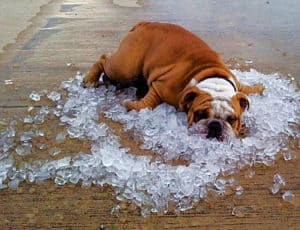We have already had a hotter than normal spring. Seeing temperatures in the 80’s in April and the 90’s in May and 100 in June is just not what we expect here in the Northwest. As it heats up and we tend to wear less clothing, then the diets start, and I hear both stories from my patients either about how they love the heat or they hate the heat. And that they either gain weight or they lose weight in the summer. So why is that? And does heat help weight loss?

Do our metabolism’s change? Probably not. Our bodies are well-tuned to keep things at status quo. If anything, our metabolism may go up when we’re cold, as our bodies need to work harder to maintain our temperature (by shivering). In the heat, our bodies actually slow down a bit to try to conserve energy so as not to overheat. But none of this really makes any significant change in our BMR or how many calories our body needs.
Some people say that their appetite decreases when it’s hot outside. One would think that if you are eating less that of course you would lose weight. That’s where my patients differ. For some people, less food automatically and quickly means weight loss. For other people, a decrease in food, can alert the body into thinking that starvation is very close so energy should be conserved at all costs. Thus, their bodies hold on and don’t release weight.
What is important to note is that in hot weather your body is prone to dehydration, and this actually can have an effect on your metabolism. In the course of an average day, sweating, breathing, and waste elimination together leach more than 10 cups of water out of your body — and that’s without exercise. If you don’t replace what you’ve lost, you may become dehydrated; your system literally begins to dry out.
When your body is dehydrated, your scale may say that you are losing weight. Since we are a large percentage of water, that would make sense. The problem is that it’s not sustainable. As soon as you rehydrate, and you will want to rehydrate, the “weight loss” will be regained. If you have ever watched wrestlers, boxers, or jockeys right before their weigh-ins, you see them all bundled up and working out in the sauna, all for that short term weight loss, so they can weigh in under their weight limit. It’s very effective, short term, and highly unhealthy and ineffective long term. I don’t recommend sweating as a strategy for weight loss.
Dehydration lowers your body’s energy levels. Because blood is mostly water, when you’re dehydrated the volume of your blood diminishes, lowering amounts of oxygen and nutrients that reach your tissues. Recent studies show there’s a trickle-down effect on metabolism: Dehydration can slow your system to such an extent that you burn fewer calories than you would otherwise during the course of the day. And dehydration can cause other undesirable symptoms, including headache, dizziness, muscle weakness, and a dry, sticky mouth.
Hydration can help maintain a healthy weight.
- The volume of a glass of water in your belly can make you feel full.
- Water dilutes sodium levels in your body, combating fluid retention.
- Try drinking a glass of water whenever you feel the urge to snack, you may discover the cause was thirst, not hunger — thereby staving off nibbling.
To stay well-hydrated, follow these guidelines:
Aim for 8 – 10 8 oz. glasses a day
Hydrate more when working out. Consume six to eight ounces of water every 20 minutes when exercising, and then have two eight-ounce glasses afterwards to restore fluids.
Avoid drinking your calories. Sodas and fruit juices may quench your thirst, but they’re loaded with sugar. Similarly, sports drinks can pack a calorie punch.
Watch out for drinks that dehydrate. Caffeinated soda, tea, coffee and alcohol all have a diuretic effect, causing fluid loss. If you drink coffee or a cocktail, follow up with an extra water chaser to stay in balance.
If you have a tough time downing enough water, try these strategies:
- If you dislike the lack of flavor, add herbs like mint or basil, or slices of citrus fruits or cucumber to a pitcher of water. Your next glass will be infused with refreshing taste.
- Try tea — hot or iced. It’s calorie-free and flavorful.
- Green tea is another option; its caffeine is surrounded by tannic acid compounds that slow its release into the bloodstream, minimizing its dehydrating effects. Green tea is also a good source of the antioxidant EGCG, which has a mild metabolism-boosting effect. Four cups of green tea per day can kick up your metabolism by 80 calories. Its rich antioxidant reserves are also thought to help combat diseases from Alzheimer’s to cancer.
- Try warm water. Sounds odd doesn’t it? For some people, drinking water can make them feel a bit nauseous. Drinking warm water can help avoid that sensation.
A Suggestion from the Traditional Chinese Medicine perspective
Watermelon is known in Chinese medicine for its ability to clear summer heat and calm the spirit, while nourishing the body fluids and promoting urination. In the Western view of nutrition, watermelon is high in carotenoids such as lycopene and antioxidants such as vitamin A and C. It is also high in electrolytes, which is why it is so good for helping us stay hydrated.
It’s really easy to make watermelon juice as well. You just put slices (seeds are okay but not rinds) into your blender and then add water and turn it on for just a few seconds.
Ready for treatment?
Call 503-246-0103 to schedule an appointment.
Have a question?
To submit an inquiry to one of our professionals, email us at contact@riverwestacupuncture.com.Have a question about acupuncture or some of our other services? Send us your question and we’ll get back to you shortly with a reply!
